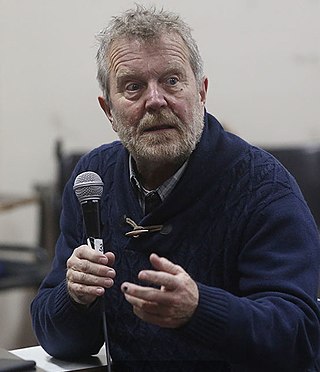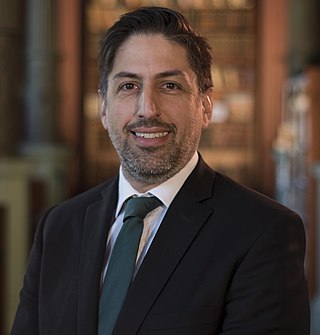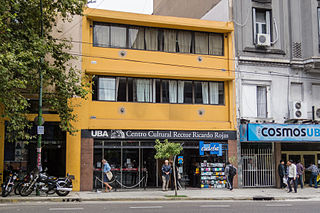
The University of Buenos Aires is a public research university in Buenos Aires, Argentina. It was established in 1821. It has educated 17 Argentine presidents, produced four of the country's five Nobel Prize laureates, and is responsible for approximately 40% of the country's research output.

Daniel Fernando Filmus is an Argentine politician and academic, who served as the country's Minister of Science, Technology and Innovation, from 2021 to 2023.

Esteban José Bullrich is an Argentine politician. A member of Republican Proposal (PRO), he served as a National Senator for Buenos Aires Province from 2017 to 2021, and as Minister of Education from 2015 to 2017, during the presidency of Mauricio Macri. Prior to that, he served as education minister of the Autonomous City of Buenos Aires, also under Macri, and as a National Deputy from 2005 to 2010.

Villa Lugano is a barrio (neighbourhood) in Buenos Aires, Argentina, located in the south of the city. It has a population of approximately 114,000 people. It is delimited by Avenida Eva Perón, Avenida General Paz, Calle José Barros Pazos, Avenida Lisandro de la Torre, Avenida Coronel Roca and Avenida Escalada. To the south-east it limits with La Matanza Partido.

Juan Carlos Tedesco was an Argentine academic and policy maker who was the President's Education Minister, from December 2007 to July 2009.

Axel Kicillof is an Argentine economist and politician who has been Governor of Buenos Aires Province since 2019.

Mariano Recalde is an Argentine lawyer and Justicialist Party politician. He currently serves as a National Senator for the Autonomous City of Buenos Aires since December 2019, representing the Frente de Todos. He previously served as a Legislator at the Buenos Aires City Legislature and as president of Aerolíneas Argentinas, Argentina's state-owned flag carrier airline from 2009 to 2015.

Tomás Várnagy was an Argentine social scientist and philosopher, professor at the University of Buenos Aires (UBA).

Roberto Carlos Salvarezza is an Argentine biochemist, researcher and politician. He was Argentina's Minister of Science, Technology and Innovation from 2019 to 2021, in the cabinet of President Alberto Fernández.

Daniel Fernando Arroyo is an Argentine political scientist, professor and politician. He was the country's Minister of Social Development, in the cabinet of President Alberto Fernández, from 2019 to 2021. Since 2021, he has been a National Deputy elected in Buenos Aires Province, a position he previously held from 2017 to 2019.

Nicolás Alfredo Trotta is an Argentine politician. He was Argentina's Minister of Education from 10 December 2019 to 20 September 2021, in the cabinet of President Alberto Fernández.

Juan Carlos Alderete is an Argentine trade unionist, social activist and politician, and the leader of the Corriente Clasista y Combativa (CCC), the labour wing of the Revolutionary Communist Party. He rose to prominence in the late 1990s due to his role in the Piquetero movement.

Emiliano Benjamín Yacobitti is an Argentine politician. He is a member of the Radical Civic Union (UCR), and served as the Buenos Aires City UCR Committee from 2013 to 2017. From 2019 to 2023, he was a National Deputy elected in the City of Buenos Aires.

Alejandro Esteban "Topo" Rodríguez is an Argentine politician, currently serving as National Deputy representing Buenos Aires Province. A member of the Justicialist Party, Rodríguez was elected in 2019 for the Federal Consensus coalition. He previously served as Minister of Agrarian Affairs of Buenos Aires Province in the administration of Governor Daniel Scioli.

The Faculty of Social Sciences, commonly and informally known as Sociales, is the social sciences faculty of the University of Buenos Aires (UBA), the largest university in Argentina. It was founded in 1988, and offers degrees on social work, sociology, labor relations, communication and political science, in addition to a number of post-graduate degrees.

The Centro Cultural Ricardo Rojas is a cultural center in Buenos Aires, Argentina. It is owned and operated by the University of Buenos Aires (UBA), the country's largest university. It is named after journalist and writer Ricardo Rojas (1882–1957), who served as the university's rector from 1926 to 1930.

The Faculty of Philosophy and Letters, also known as Filo, is a faculty of the University of Buenos Aires (UBA). The faculty was founded in 1896, making it one of the oldest faculties at the university. It offers graduate degrees in multiple subjects including philosophy, literature, anthropology, history, arts, education, geography, modern and classical languages, and literary editing, as well as post-graduate degrees at the magister, doctoral, and post-doctoral level.

The Editorial Universitaria de Buenos Aires, doing business as Eudeba, is the university press of the University of Buenos Aires, the largest university press in Argentina and one of the largest in Latin America.

The Federación Universitaria de Buenos Aires is a federation of students' unions in the University of Buenos Aires (UBA). It was founded in 1909, and presently represents the over 300 thousand graduate students enrolled at UBA. It forms part of the Argentine University Federation, and is its largest member.




















